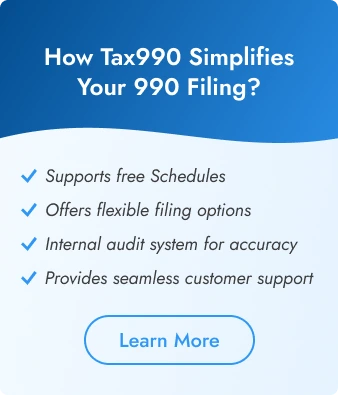IRS Form 1023 Overview:
- Updated August 14, 2023 - 2.00 PM - Admin, Tax990
Nonprofit organizations that are established and operated for exempt purposes can obtain tax-exempt status from the IRS, provided they meet necessary requirements. In order to do this, they must apply for exemption through an application form.
Form 1023 is an application form that certain nonprofits can use to apply for tax exemption. This article details the purpose, filing requirements, and certain other information regarding Form 1023.
Table of Contents
What is the Purpose of Form 1023?
Form 1023–Application for Recognition of Exemption Under Section 501(c)(3) of the Internal Revenue Code–is used by nonprofits seeking tax-exempt status under Internal Revenue Code (IRC)
section 501(c)(3).
Organizations eligible to file Form 1023 can also choose to file Form 1023-EZ instead, if they so choose (depending on their eligibility according to the
eligibility worksheet).
Who Can File Form 1023?
Form 1023 is generally filed by nonprofits with religious, educational, charitable, literary, and other similar primary operational purposes described under section 501(c)(3) to apply for tax-exempt status.
Some of the most common organizations that file Form 1023 are:
Schools
Hospitals
Animal Rescues
Sports Clubs
Scientific Organizations
When Should You File Form 1023?
In order to be recognized as exempt from the organization’s formation, the nonprofit should file Form 1023 within 27 months from the end of the month when it was formed.
If filed after 27 months since formation, the organization will only be considered as tax-exempt
from the
filing date.
What Information is Required to File Form 1023?
Form 1023 comprises 10 parts. Below, you’ll find a summary of what key information required in Form 1023:
Basic organization details (name, EIN,
address, etc)
Officers, directors, and trustees basic details
Organizational structure (corporation, LLC, etc)
All required organizing documents (articles of incorporation, trust agreement, articles
of association)
Description of the organization’s past, present, and future activities
Compensation details of the organization members and other financial data.
Public Charities and Private Foundations
One of the major details to report in Form 1023 is how organizations are classified. Unless
the filing organization specifies itself as a public charity, the IRS will classify it as a
private foundation.
If the organization is requesting public charity status, it must provide the information required to indicate its public support status. Learn more about public charities
What are the Additional Requirements for Filing
Form 1023?
Organizations that file Form 1023 may also be required to include applicable Schedules; these are used to report certain additional information required by the IRS, depending on what you report.
There are 8 available schedules for Form 1023:
Schedule A - Churches
Schedule B - Schools, Colleges, and Universities
Schedule C - Hospitals and Medical Research Organizations
Schedule D - Supporting Organizations
Schedule E - Effective Date
Schedule F - Low-income Housing
Schedule G - Successors to Other Organizations
Schedule H - Organizations Providing Scholarships, Fellowships, Educational Loans, or Other Educational Grants to Individuals and Private Foundations Requesting Advance Approval of Individual Grant Procedures.
How to file Form 1023 electronically?
The IRS mandates the e-filing of Form 1023. Therefore, organizations must submit their 1023
application electronically.
The steps to file Form 1023 are as follows:
What Happens After Obtaining Tax Exemption with
Form 1023?
Once the Form 1023 has been approved, the IRS will provide a determination letter recognizing the organization as tax-exempt.
While nonprofits recognized as tax-exempt are no longer required to pay federal income tax, they still must report their financial information, activities, and certain other details to the IRS annually through a
Series 990 Form.
Based on the organization’s gross receipts & assets, they will file the applicable form:
Form 990-N : Filed by organizations with gross receipts of $50,000
or less.
Form 990-EZ : Filed by organizations with gross receipts less than $200,000 and assets less
than $500,000.
Form 990 : Filed by organizations with gross receipts of $200,000 or more (or) assets of
$500,000 or more.
Form 990-PF : Filed by Private Foundations, regardless of gross receipts/assets.
Tax990 Simplifies 990 Filing for Nonprofits!
Along with the 1023 Form, the IRS has also mandated the e-filing of 990 forms–meaning it’s vital that nonprofits find a trusted e-filing service for their 990 returns!
Tax990, an IRS-authorized e-file provider, serves as the one-stop solution for nonprofits looking to meet their 990 filing requirements. Get started today!


